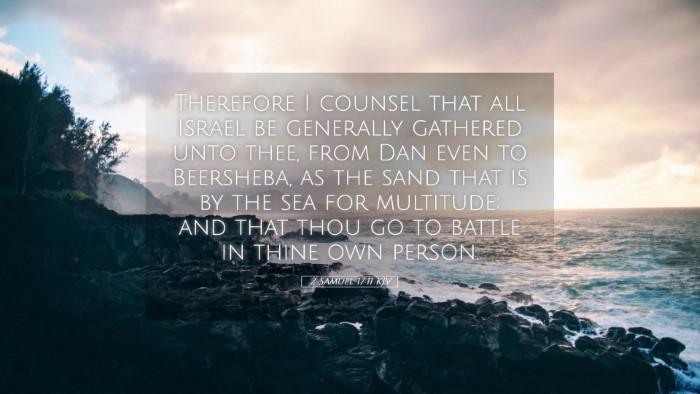Commentary on 2 Samuel 17:11
Verse: “But I counsel you, that all Israel be gathered unto you, from Dan even to Beer-sheba, as the sand that is by the sea for multitude; and that you go to battle in your own person.”
Introduction
This verse, situated in the context of Absalom's rebellion against his father David, captures the strategic advice given by Ahithophel, a seasoned counselor. This commentary synthesizes insights from prominent public domain sources, illustrating both the historical context and the theological implications of the passage.
Contextual Background
Ahithophel advises Absalom to gather all Israel to himself, emphasizing the need for unity and a show of strength against David. His knowledge of Israel’s geographic and social landscape is crucial; mentioning “from Dan even to Beer-sheba” indicates the breadth of national support needed for a successful rebellion.
Geographical Significance
- Dan: Located in the north, it symbolizes the northernmost part of Israel.
- Beer-sheba: Found in the south, it represents the southern boundary.
The phrase “as the sand that is by the sea for multitude” suggests an overwhelming force, evoking images of numbers that would intimidate David's supporters and bolster Absalom's claim for kingship.
Theological Insights
This verse carries deeper theological themes that resonate throughout Scripture, reflecting God's sovereignty even amidst human rebellion. While Absalom seeks power through manipulation and deceit, God’s plans unfold in profound ways that will ultimately lead to accountability and justice.
Human Counsel vs. Divine Plans
Ahithophel’s counsel illustrates the wisdom of men, which often diverges from the will of God as exemplified later in the narrative (2 Samuel 17:14). Here, we see a tension between pragmatic strategy and the overarching divine purpose. God uses even ungodly advice to serve His sovereign purposes, leading to the downfall of Absalom.
Application for Leaders
For spiritual leaders, the verse serves as a poignant reminder of the importance of seeking divine guidance over solely relying on human wisdom. While military tactics may seem favorable, leaders must pray for discernment, acknowledging that true victory comes from God.
Character Analysis
Absalom: The passage reflects Absalom's ambitious character, showcasing how he is willing to heed the counsel of others to further his quest for power. His lack of ethical governance becomes evident as he prepares to go to battle.
Ahithophel: The wisdom of Ahithophel is portrayed as formidable; however, his counsel is ultimately used for destructive ends. This reveals a significant point about wisdom: it must be directed toward godly ends to be truly beneficial.
Lessons on Counsel
- Always align counsel with biblical truths.
- Be vigilant against wisdom that leads to self-serving motives.
- Understand the consequences of counsel that lacks integrity.
Historical Interpretation
Historically, this verse serves as a pivotal junction in the power dynamics within Israel. The advice to muster such substantial forces signified a turning point whereby Absalom moves from rebellion to active conflict, raising the stakes of the struggle between him and David. Commentators note that this was indicative of the political mass mobilization practices that would characterize Jewish warfare.
Implications for Israel’s Future
The decision to gather all of Israel leads to deeper divisions within the nation, setting a precedent for future conflicts. This underscores the vulnerability of a divided heart among God’s people, a theme recurrent throughout Israel’s history.
Conclusion
2 Samuel 17:11 invites readers to ponder the complexities of leadership, the nature of counsel, and the precedents set by human decisions against the backdrop of God's sovereign rule. The lessons gleaned from Ahithophel’s advice and Absalom's actions resonate with contemporary faith communities, reminding spiritual leaders to seek God’s wisdom—a treasure far surpassing worldly counsel.
In summary, this passage is not merely about a military strategy but offers profound insights into the nature of rebellion, the importance of divine guidance, and the consequences of a heart turned away from God.


